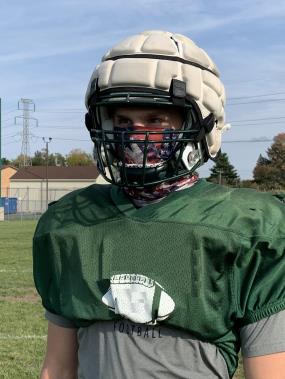Henry Ford Video Reminds Athletes to Wear Masks During High School Sports

DETROIT – A new video message from the Henry Ford Sports Medicine team reminds high school athletes about the importance of properly wearing face masks during competition to help reduce the spread of COVID-19.
The restart of fall high school sports in Michigan comes with the requirement from the Michigan Department of Health that student athletes wear face coverings during most organized sports competitions. Along with social distancing and hand hygiene, properly wearing the right masks the right way during sports is essential for athletes to protect themselves, their communities and ensure that competition continues.
“Treat your face mask like you would your helmet, mouthguard or any other safety gear. It is there to protect you,” said Meghan Rourke, one of more than 30 Henry Ford Sports Medicine athletic trainers who support athletic programs at high schools, colleges, universities and professional teams in Southeast Michigan.
As athletics move indoors with winter sports like basketball, hockey, wrestling, gymnastics and cheer competition, properly wearing masks will become even more important in reducing the spread of COVID-19. Swimmers and divers are exempt from wearing masks in the pool or when diving. However, they are recommended while on the pool deck waiting for events to start.
“We know that younger people are susceptible to COVID-19 and can spread it to others,” said Joneigh Khaldun, M.D., chief medical officer and chief deputy director for the Michigan Department of Health & Human Services. “It’s very important for everyone to help stop the spread by wearing a mask at all times during sports activities and that they wear it properly, over their nose and mouth.”
“We know of dozens of COVID-19 outbreaks associated with sports teams or athletic facilities,” added Dr. Khaldun. “It’s important for young athletes to know that they’re susceptible to this disease and can spread it to others, including older people who are more likely to get very sick.”
“The way each sport is played and how close players are to each other during competition determines the risk level, and properly wearing the right mask is important in reducing that risk,” said Robert Albers, D.O, a specialist for Henry Ford Sports Medicine.
According to CDC guidelines on playing sports, the risk levels for COVID-19 can differ based on the type of activity:
- Lowest Risk: Performing skill-building drills or conditioning at home, alone or with members of the same household
- Increasing Risk: Team-based practice
- More Risk: Within-team competition
- Higher Risk: Full competition between teams from the same local geographic area (e.g., city or county)
- Highest Risk: Full competition between teams from different geographic areas (e.g., outside county or state)
The CDC recommends wearing masks if feasible, especially when it is difficult to stay six feet apart from other players, or for indoor sports such as basketball where close contact is inevitable. The CDC also recognizes that athletes in higher intensity sports may not be able to wear a mask if it causes difficulty in breathing.
Research shows that wearing a mask during high levels of strenuous athletic activity can increase heart and respiratory rates. In those cases, Dr. Khaldun recommends limiting the physical exertion by taking frequent breaks and removing the mask while social distancing on the sidelines. “There are also plastic shields for football and hockey players which don’t replace the effectiveness of a mask, but it’s still a layer of protection that can help decrease the spread of the virus,” said Dr. Khaldun.
Wearing the wrong mask can not only affect performance, it could adversely affect an athlete’s health.
For instance, respirator masks such as the N95 type will affect breathing and performance and are not recommended for sports activities because they can cause the sensation of having to breathe harder and affect the cardiovascular system, according to Ramsey Shehab, M.D., deputy chief of Sports Medicine at Henry Ford Health System. “Pulmonary and cardiac function is increased to compensate and help get more oxygen supply to the lungs and muscles,” said Dr. Shehab.
The use of masks or face coverings made of synthetic fabric, like nylon which increases air intake and remains dry during competition, is recommended, “If you have a more breathable mask, you’ll feel more comfortable with the amount of air you’re getting and your heart won’t have to work harder to compensate,” said Dr. Shehab. Cloth masks are not recommended since their level of viral protection decreases once they’re wet.
###
About Henry Ford Health System
Founded in 1915 by Henry Ford himself, Henry Ford Health System is a non-profit, integrated health system committed to improving people’s lives through excellence in the science and art of healthcare and healing. Henry Ford Health System includes six hospitals including Henry Ford Hospital in Detroit; Henry Ford Macomb Hospitals; Henry Ford Wyandotte Hospital; Henry Ford West Bloomfield Hospital; Henry Ford Allegiance in Jackson, MI; and Henry Ford Kingswood Hospital – an inpatient psychiatric hospital.
Henry Ford Health System also includes Henry Ford Medical Group: Henry Ford Physician Network; more than 250 outpatient facilities; Henry Ford Pharmacy; Henry Ford OptimEyes; and other healthcare services. Our not-for-profit health plan, Health Alliance Plan – HAP – provides health coverage for more than 540,000 people.
As one of the nation’s leading academic medical centers, Henry Ford Health System trains more than 3,000 medical students, residents, and fellows annually in more than 50 accredited programs, and has trained nearly 40% of the state’s physicians. Our dedication to education and research is supported by nearly $100 million in annual grants from the National Institutes of Health and other public and private foundations.
Henry Ford Health System employs more than 33,000 people, including more than 1,600 physicians, more than 6,600 nurses and 5,000 allied health professionals. For more information, go to henryford.com
###
MEDIA CONTACT: Sal Giacona / sgiacon1@hfhs.org / 313-421-9108
.svg?iar=0&hash=F6049510E33E4E6D8196C26CCC0A64A4)

/hfh-logo-main--white.svg?iar=0&hash=ED491CBFADFB7670FAE94559C98D7798)









